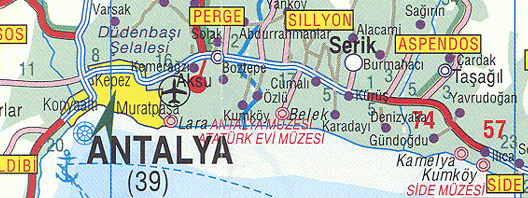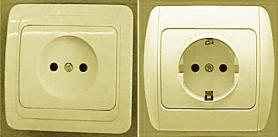
For those who need to obtain their visa at the point of entry: the window(s) for doing that are before the passport control. Have the fee ready in euros or US dollars, or, if you're from the U.K., pounds Stirling.

 Summer Time
Summer TimeDuring the week of the meeting:
| 20.00 | pm | in Turkey |
| = 18.00 | pm | in Great Britain |
| = 17.00 | pm | UTC |
| = 12.00 | noon | EST |
| = 9.00 | am | PST |
 Climate
Climate

 The one to the right is grounded.
Don't forget to bring your plug adaptors.
The one to the right is grounded.
Don't forget to bring your plug adaptors.

Do not enter a mosque with your shoes on. Women should cover their heads. Ask in advance if it is OK to enter. Avoid the Friday-prayer period.
Turks are generally friendly and hospitable. If you're offered a cup of tea, say, by all means feel free to accept it. It is an honestly friendly gesture, and nothing is expected in return.
(Like any other country, Turkey has its share of crooks and con-men, so don't let your guard down completely.)
Should you be invited into a private home, then it is polite to take off your shoes as you enter. Make sure to use your right hand to pick up any food you're offered.
Be careful with gestures. Some common Western gestures have a quite different meaning. To beckon someone, extend your arm towards the person, with the palm of the hand facing down; then repeatedly bend your four digits (but not the thumb), together, towards yourself. Other beckoning gestures than the one described will probably not be understood, and may, moreover, come across as rude.

As of 1 January 2006, the new lira is the only currency in circulation. Designated TRY outside Turkey, you will see YTL (Yeni Türk Lirası) in Turkey. Unfortunately, not all Turks have made the required mental switchover, and you may see or hear price designations in the old currency. If a price is said to be "fifty thousand" and you're not buying a house, it is most likely 0,05 YTL. (In Turkey, like in many European countries, a decimal comma is used instead of a decimal point.)
Roughly, 1,00 YTL = € 0.67 = US$ 0.75. (So, for converting to euros, subtract one third of the amount; for dollars, one fourth).
One new lira is equivalent to 100 new kuruş (pronounced kooroosh).
If someone offers you change in old liras, refuse it. Demand new liras.
You can read everything about the security features of the new lira banknotes and coins in the New Turkish Lira brochure.
In tourist areas (like Antalya) there are ATMs and banks everywhere, and many shops and restaurants accept credit cards. It may be useful to have some pocket change, for example for visiting public restrooms, for tipping, or for taking a dolmuş.
Don't tip if you're unhappy with the service. A tip of 10% of the bill is normal. When paying with a credit card, it is best to leave the tip in cash.
Nodding is an affirmative gesture. But shaking your head left to right is not commonly understood to mean a negative; rather, it suggests confusion or lack of understanding. Instead, if you want to gesture a no, tip your head briskly back, raising your chin: an anti-nod. Uttering a tsk sound at the same time confirms the negative intention. This is a common and not impolite way of saying no, thanks.
If you hear the Turkish word yok in a context where you expect a yes-or-no answer, it also means no.